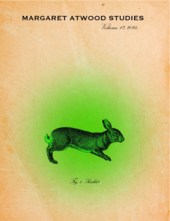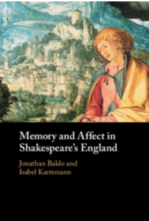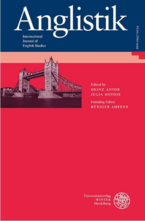Latest Publications
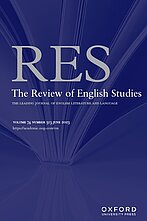
Noting the scarcity of extended investigations of feeling in Shakespeare’s Sonnets, this essay approaches the topic through the concept of articulation. On this basis, it becomes possible to trace the process of how Shakespeare’s lyrics produce rather than express emotion: feeling emerges in the act of speaking about feeling, which is also the attempt of segmenting heterogeneous affective states into distinctly conceptualized feelings. Examining the articulation of emotion within and between sonnets, the essay finds the gist of the poetry not in the success but in the persistent—and, it is argued, programmatically determined—‘failure’ of these attempts.
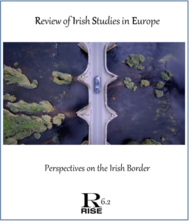
“Global Borders in Kenneth Branagh’s Belfast (2021)”. Review of Irish Studies in Europe 6.2 (2023): 58-72. (Open Access)
RISE 6.2 offers new perspectives on the Irish border. Bringing together contributions from different disciplines and cultural fields – history, political science, film studies, constitutional law and the theatre – it seeks to provide a multifaceted and complex discussion of a phenomenon that is all too often simplified in the political discourse before and after the 2016 Brexit referendum. Following the agenda suggested by the short film-essay Hard Border (2018), directed by Juliet Riddell and performed by Stephen Rea, this themed issue of RISE approaches the Irish border by differentiating between internal and external – Irish and Northern Irish, British and continental – perspectives and by exploring historical dimensions as well as contemporary engagements with a border whose increasing (discursive and material) invisibility following the Belfast/Good Friday Agreement of 1998 has been crucial to the ongoing peace process.
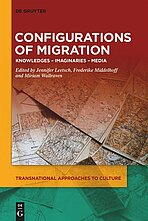
Configurations of Migration (Open Access)
In a global context in which phenomena of migration play an ever more important role, the ways individual and collective experiences of migration are covered in the media, represented in culture, and interpreted are coming under increasing scrutiny. This book explores the complex relationship between creative engagements with migration on the one hand, and forms of knowledge about migration on the other, inquiring into the ways aesthetic practices are intertwined with knowledge structures. The book responds to three pressing research questions. First, it analyses how fictional texts, plays, images, films, and autobiographical accounts mediate forms of knowledge about migration. Second, it identifies the ways in which specific media approaches and aesthetic practices influence people’s ideas about and awareness of migratory experiences in a globalized world. Finally, it delineates how historical perspectives help us compare epistemological approaches to migration in the nineteenth, twentieth, and early twenty-first centuries, and how these approaches affect the way critics and the public responded to and thought about different forms of (forced) migration. Bringing together renowned scholars working across disciplines, it investigates the possibilities and limitations that different media present when it comes to reflecting on, communicating, and imagining experiences of migration, and how these representations in turn create ways of knowing and understanding migration.
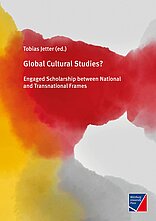
Series editorship, in collaboration with MaryAnn Snyder-Körber: JMU Cultural Studies. Würzburg University Press.
The first volume of the new series is now out: Jetter, Tobias, Hg. Global Cultural Studies? Engaged Scholarship between National and Transnational Frames. Würzburg: Würzburg UP, 2023.JMU Cultural Studies / JMUCS I. Druck- und Online-Ausgabe. DOI: https://doi.org/10.25972/WUP-978-3-95826-207-2
Can cultural studies attend to the problems of our globalized world? Or is this project of “engaged scholarship” too deeply rooted in the parochial terrain of the national?This collection of essays – the first volume in the new JMU Cultural Studies publication series – attends to this vital yet difficult question. Based on joint seminars bringing together emerging scholars from Germany and India, the contributions confront “classic texts” from US-American, British, and Indian cultural studies with the specific concerns and contemporary perspectives of the authors. The collection thus tests the potentials of the tradition to speak to the transnational as well as the national environments of the very present. Emphasis is placed on Marxist and feminist legacies which are then projected into the domains of contemporary, food, and film studies.
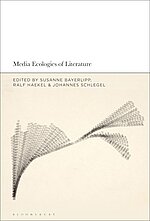
This book explores the media ecologies of literature – the ways in which a literary text is interwoven in its material, technical, performative, praxeological, affective, and discursive network and which determine how it is experienced and interpreted. Through novel approaches to the complex, contingent and interdependent environments of literature, this volume demonstrates how questions about the mediality of literature – particularly in the wake of digitization – shed a new light on our understanding of textuality, reading, platforms and reception processes. By drawing on recent developments in advanced media theory, Media Ecologies of Literature emphasizes the productivity of innovative re-conceptualizations of literature as a medium in its own right. In an intentionally wide historical scope, the essays engage with literary texts from the Romantic to the contemporary period, from Charlotte Smith and Oscar Wilde to A. L. Kennedy and Mark Z. Danielewski, from the traditionally printed novel to audiobooks and reading apps.
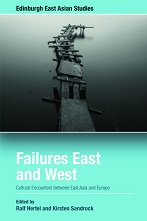
Failures East and West - Cultural Encounters between East Asia and Europe
Often, the story of encounters between Asia and the West has been told as one of success, of cross-fertilization, reciprocal stimulation and an exchange of commodities and knowledge. Yet, the history of East-West encounters is riddled with prominent examples of misunderstandings, ignorance, unrealistic expectations or unbridgeable cultural differences. Bringing together scholars working across Chinese Studies, Japanese Studies, English Studies and French Studies, this book presents new perspectives on such instances by theorizing epistemologies of failure. Providing examples from different periods and disciplines, it reveals how culturally informed expectations and biases, performative and linguistic practices and imaginative horizons specific to the cultures involved shape notions of failure and success. Case studies range from first encounters in the early modern period to contemporary novels and focus on actual or imaginary encounters between East Asia and Western European cultures.
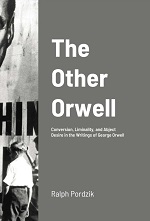
Contents: The Textual Kinetics of Orwell’s Major Fiction - The Half-Buried Art of Sexual Innuendo. Reading Orwell’s Queer Desire(s) - Nineteen Eighty-Four as Conversion Narrative - Orwell’s Imperial Bestiary. Animal Agency and Cross-Species Interaction - The Poetics of Etcetera. Orwell’s Literary Lists - Orwell’s Sublime Perversions
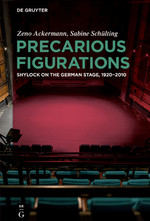
Precarious Figurations focuses on the reception of Shakespeare’s The Merchant of Venice in twentieth- and twenty-first-century Germany. Looking at theatrical practices and critical or scholarly discourses from the Weimar Republic to the new millennium, the book explores why the play has served simultaneously as a vehicle for the actualization of anti-Semitic tropes and as a staging ground for the critical exposure of the very logic of anti-Semitism. In particular, the study investigates how the figure of Shylock has come to be both a device in and a stumbling block for attempts to bridge the fundamental rupture in civilization brought about by the Holocaust. The careful analysis of the German reception of Merchant, and in particular of the ways of doing and reading Shylock in the context of painful German, and German-Jewish, discourses of identity and remembrance, is designed to raise fundamental questions – questions concerning not only the staging of Jewishness, the tenacity of anti-Semitism and the difficulties of Holocaust remembrance, but also the general potentials and limitations of theatrical interventions into cultural conflicts.
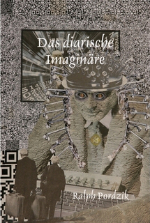
Pordzik, Ralph. Das diarische Imaginäre: Zur Phänomenologie und Architektonik des modernen Tagebuchs. Würzburg: École Noire, 2019.
»Das diarische Imaginäre« versammelt Eindrücke, die sich beim Anlegen eines eigenen Tagebuchs eingestellt haben und kleidet sie in rhapsodische semiologische Begriffe, mit denen die »unleserliche« Seite des Diariums freigelegt werden soll, jene Ordnung der Zeichen unter dem bedeutungstragenden Material, die mehr ist als nur ein System praktischer Buchführung, bestehend aus Ergriffenheit und Beichte, chronistischer Fülle und gehaltloser Endlichkeit. Es ist weder Abriß noch Essay oder Untersuchung, sondern Bestandsaufnahme des Tagebuchs als Medium eines Schreibens, in dem sich unzählige Register vermischen und Glossen einander unterwandern, wo Zuweisungen und Urteile sich verirren und die tägliche Rede des Einzelnen als ein unablässiges Aufspüren und Überlisten, ein Sich-Verlieren in unsicheren Aussagen und Äquivalenzen, Relief gewinnt.
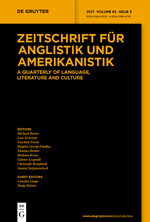
This special issue investigates the relation between cultural techniques and literature. A vibrant topic in contemporary media theory, it is the aim of the articles assembled here to discuss the merits of cultural techniques in the field of literary studies and thus to fathom possible synergies.
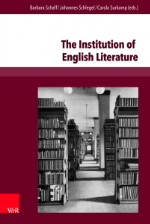
The contributions investigate the ways in which numerous institutions of English literature shape the literary field. While they cover an extensive historical field, ranging from the Early Modern period to the 18th century to the contemporary, they focus not only on literary texts, but also on extra-literary ones, including literary prizes, literary histories and anthologies, and highlight the various ways in which these negotiate the processes that constitute the literary field. All contributions assert that there is no such thing as literature outside of institutions. Great emphasis is therefore put on different acts of mediation.
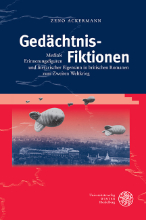
Gedächtnis-Fiktionen versteht sich als Beitrag zur Mediengeschichte des britischen Romans. Die Studie fragt, wie sich Romantexte und -poetiken seit 1945 nicht nur zu den umstürzenden Gewaltereignissen, sondern auch zu den weiterklingenden Medien- und Mobilisierungsdiskursen des Zweiten Weltkriegs verhalten haben. Unter anderem werden Texte von Elizabeth Bowen, George Orwell, J. G. Ballard, W. G. Sebald und A. L. Kennedy in ihren mediengeschichtlichen Kontexten diskutiert. Wie verhandeln solche Romane totale Mobilisierung und totale Gewalt? Wie positionieren sie sich zu emphatischen Konzeptionen massenmedialer Wirkmächtigkeit? Welche Bedeutung wird Konzepten von Gedächtnis und Sinnlichkeit, Kollektivität und Eigensinn zugeschrieben? Entlang dieser Fragen spannt Gedächtnis-Fiktionen einen Bogen, der von den mediatorischen Diskursen der Kriegszeit über die dissoziative Rhetorik des Nachkriegsromans bis zu den Vermittlungsfiguren einer multimedialen 'Erinnerungskultur' reicht.
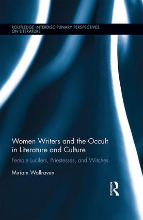
Examining the intersection of occult spirituality, text, and gender, this book provides a compelling analysis of the occult revival in literature from the 1880s through the course of the twentieth century. Bestselling novels such as The Da Vinci Code play with magic and the fascination of hidden knowledge, while occult and esoteric subjects have become very visible in literature during the twentieth century. This study analyses literature by women occultists such as Alice Bailey, Dion Fortune, and Starhawk, and revisits texts with occult motifs by canonical authors such as Sylvia Townsend Warner, Leonora Carrington, and Angela Carter. This material, which has never been analysed in a literary context, covers influential movements such as Theosophy, Spiritualism, Golden Dawn, Wicca, and Goddess spirituality. Wallraven engages with the question of how literature functions as the medium for creating occult worlds and powerful identities, particularly the female Lucifer, witch, priestess, and Goddess. Based on the concept of ancient wisdom, the occult in literature also incorporates topical discourses of the twentieth century, including psychoanalysis, feminism, pacifism, and ecology. Hence, as an ever-evolving discursive universe, it presents alternatives to religious truth claims that often lead to various forms of fundamentalism that we encounter today. This book offers a ground-breaking approach to interpreting the forms and functions of occult texts for scholars and students of literary and cultural studies, religious studies, sociology, and gender studies.
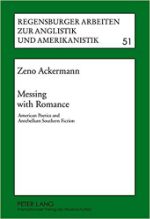
Messing with Romance is a reinvestigation of antebellum southern literary history and a case study in the potentials of genre criticism. Offering contextualized readings of novels produced by representatives of the southern elite between 1824 and 1854, the study traces a development that is as fascinating as it is contradictory: from pretences of 'realism' to bold fantasies of fiction's socially transformative power – and eventually towards the collapse of the discourse of 'romance' to which southern novelists had contributed with such desperate determination. Along the way, prominent critical clichés come under scrutiny: firstly, that antebellum southern literature followed a clear-cut course of radicalization; secondly, that literary conventions can easily be identified as the determining formats of ideological discourses.
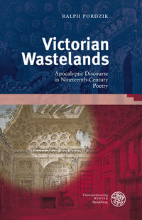
It has long been a commonplace to argue that apocalyptic touched Victorian writers more profoundly than any other spiritual issue of the age. Doom and disaster seemed far more probable to them than any millennium, divine or earthly, they could imagine. This study attempts a short critical history of apocalyptic poetry written in the nineteenth century, arguing that Victorian poets gradually changed their view of the End and with it the literary forms in which it was to be explored and symbolized. In a series of transactions informed by scientific change and deeply affecting their aesthetic perception, they lost faith in the regenerating powers of myth and in the concept of the infinite according to which transcendence and cosmic transformation represented vital possibilities within a comforting spiritual vision of hope and renovation. The apocalyptic poem became a privileged site of negotiating the anxieties produced by continued economic and cultural revolution, incorporating memorable scenes of apocalypse or destruction on a cosmic scale but also leaving them tantalizingly unfinished at the threshold of a redeeming vision.
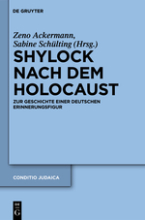
Nach dem Zivilisationsbruch des Holocaust erlangte Shakespeares Kaufmann von Venedig rasch wieder seine traditionelle Stellung nah am Zentrum des bundesdeutschen Theatergeschehens. Obwohl – oder gerade weil – das Stück in der Figur des Geldverleihers Shylock problematische Konstruktionen 'des Jüdischen' ausstellt, wurde es zum Bezugspunkt und zum Medium schwieriger Auseinandersetzungen mit den Problemen von deutschem Hass und deutscher Schuld. Der Sammelband diskutiert wesentliche Stationen dieser widersprüchlichen Rezeptionsgeschichte aus den Perspektiven der Anglistik und Germanistik, der Theaterwissenschaft und der Erinnerungsforschung. (Mit Beiträgen von Elisabeth Bronfen, Anat Feinberg, Bernhard Greiner, Maik Hamburger, Marion Hirte, Oliver Lubrich, Franziska Reinfeldt, Jens Roselt, Guido Schenkel, Sabine Schülting und Matthias Weiß.)
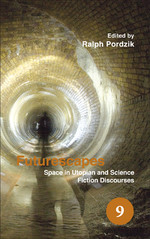
This book testifies to the growing interest in the many spaces of utopia. It intends to ‘map out’ on utopian and science-fiction discourses some of the new and revisionist models of spatial analysis applied in Literary and Cultural Studies in recent years. The aim of the volume is to side-step the established generic binary of utopia and dystopia or science fiction and thus to open the analysis of utopian literature to new lines of inquiry. The essays collected here propose to think of utopias not so much as fictional texts about future change and transformation but as vital elements in a cultural process through which social, spatial and subjective identities are formed. Utopias can thus be read as textual systems implying a distinct spatial and temporal dimension; as ‘spatial practices’ that tend to naturalize a cultural and social construction – that of the ‘good life’, the radically improved welfare state, the Christian paradise, the counter-society, etc. – and make that representation operational by interpellating their readers in some determinate relation to their givenness as sites of political and individual improvement. This volume is of interest for all scholars and students of literature who wish to explore the ways in which utopias of the past and recent present have circulated as media of cultural exchange and homogenization, as sites of cultural and linguistic appropriation and as foci for the spatial formation of national and regional identities in the English-speaking world.
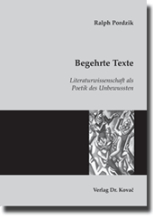
Der in dieser Schrift unternommene Versuch einer Lektüre ausgewählter Werke Christopher Marlowes, Emily Brontës, E. M. Forsters, Henry James’ und George Orwells orientiert sich am Denken einer Freud avec Lacan folgenden psychoanalytischen Hermeneutik, die bestimmte, zu früh aus den Diskursen und Gesprächen ausgefällte Lehren und Einsichten noch einmal auf ihre Tauglichkeit zu überprüfen gedenkt. Die Hypothesen des Hysterischen und des Anderen; der jederzeit mögliche Einfall unbewusster Motive und Gedanken in das feste Gefüge des Textes; das kulturelle Phänomen der Ich-Spaltung oder das Bild einer genuinen und weit reichenden Entfremdung des Subjekts durch die Sprache des Symbolischen in Neurose und Psychose – dem Eingedenken dieser Schauplätze und Genealogien des Psychischen sind die hier konkretisierten Beispiele und Analysen gewidmet. Sie interessieren sich für das, was in den Netzen der Sprache und des Sprechens hängen bleibt, was stets nur in verformter und deplazierter Gestalt auftritt und sich so als Spur des Traumatischen überhaupt erst nachträglich in den Wirkungen der Texte offenbaren kann.
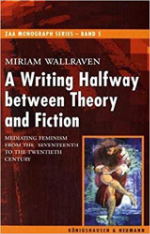
This book is focused on the surprisingly large number of feminist women writers in literary history who use different genres for their feminist ideas while subverting or transgressing established boundaries between fictional and theoretical writing. In particular, texts by such diverse authors as Mary Wollstonecraft, Mary Hays, Mary Robinson, Harriet Martineau, Olive Schreiner, Virginia Woolf, the French Feminists Hélène Cixous and Monique Wittig, Margaret Cavendish, and Michèle Roberts are analysed. This chronological indepth reading of feminist texts is based on the interrelation of content, genre and discourse. The study provides the first analysis of the phenomenon of the gendering of genre and feminists’ troubled involvement in ‘theory’ as well as ‘literature’. In this way, key questions concerning the emergence of feminism during the last four hundred years are presented in a new and revealing light; e.g., for what reason did Mary Wollstonecraft not only write her famous feminist treatise A Vindication of the Rights of Woman, but also a novel in which she tests the arguments of her theoretical treatise by means of fiction? What is the significance of Virginia Woolf’s “Novel-Essay” The Pargiters, which seeks to connect theoretical and fictional parts by juxtaposing them? How can the mixture of genres be interpreted which Catherine Clément attributes to the texts of Hélène Cixous as a “writing halfway between theory and fiction”?
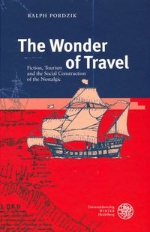
The aim of this book is to bring into focus some of the major moves in western discourses about tourism and travel writing from the early Victorian to the late modern or post-western age. It offers a series of readings connecting the work of travel writers as diverse as Alexander Kinglake, William Cobbett, George Henry Borrow, E.M. Forster and Bruce Chatwin to their respective cultural and material contexts. The grounding model is that of travel writing as a form of cultural intervention and the individual text as an artificial yet intermediary space that constantly stimulates the travellers’ consciousness, moving them to revise judgements passed on their own as well as on the other culture. In individual chapters, the study explores different stages of revision in travel discourse since the late-romantic age, surveys new touristic models installed in the place of received notions of picturesque or adventurous travel and analyses the role of exotic and nostalgic registers in the construction of cultural value.
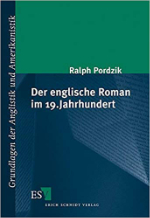
Der englische Roman des 19. Jahrhunderts gilt heute vielfach als der "verlorene Kontinent" der viktorianischen Epoche. In dieser Veröffentlichung behandelt der Autor ein großes Textrepertoire des viktorianischen Romans und beschäftigt sich mit vielen Einzelwerken und den wichtigsten Autoren, aber auch mit jenen Texten, die erst in jüngster Vergangenheit wieder zugänglich gemacht worden sind. Durch einen kulturwissenschaftlich orientierten Überblick macht er die historischen Entstehungsbedingungen einzelner Werke sichtbar. Die Interpretation bekannter Werke von Jane Austen und Mary Shelley über Charles Dickens und Henry James bis hin zu Oscar Wilde, aber auch die Analyse einiger zu Unrecht vernachlässigter Romane ergänzen sich dabei zu einer umfassenden Geschichte des englischen Romans im 19. Jahrhundert.
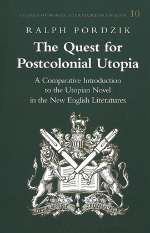
The Quest for Postcolonial Utopia is a critical introduction to utopian and dystopian fiction written in Australia, New Zealand, Canada, Africa, and India. It outlines the development of utopian writing over the last thirty years and analyzes the relationship between postcolonial and utopian issues foregrounded in these works. Based on a comparative approach that takes into account the different traditions the texts are derived from, this book examines the function of utopian alternatives and dystopian anxieties in the writings of a wide range of well-known authors such as Janet Frame, David Ireland, J M Coetzee, Nadine Gordimer, Peter Carey, Rodney Hall, Buchi Emecheta, Margaret Atwood, Glenda Adams, John Cranna, Suniti Namjoshi, Mike Nicol, Ben Okri, Gerald Murnane, and Timothy Findley.
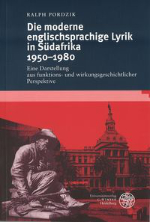
Die Studie beabsichtigt, einen literarhistorischen Beitrag zur Beschreibung der englischsprachigen südafrikanischen Dichtung im Zeitraum von etwa 1950 bis 1980 zu leisten. Am Beispiel zahlreicher, in der gegenwärtigen Diskussion teilweise vernachlässigter Autoren und Autorinnen versucht sie zu zeigen, dass der sich soeben emanzipierenden modernen Lyrik der 50er Jahre durch die Apartheid eine Richtungsänderung vermittelt wurde, die sie von ihrer ursprünglichen Zielsetzung - der Entfaltung eines modernen, nach westlichen Maßstäben geformten Idioms und des damit verbundenen Bewusstseins einer potentiellen Veränderbarkeit der gesellschaftlichen Verhältnisse durch kulturelle Aktivität - wegführte und damit einen Prozess der Inventur der westlichen Lyriktradition einleitete. Die zunächst affirmative Auseinandersetzung der südafrikanischen Lyrik mit dieser Tradition weitete sich dabei unter dem Problemdruck der Lebenswirklichkeit aus zu einer Überprüfung ihrer kulturellen und sozialen Prämissen und formalisierte sich schließlich in der Überwindung dieser Tradition in einem breiten Spektrum an Konzeptionen, die von afroamerikanischen Kultureinflüssen und populär-synkretischen Mischformen bis zur Rezitationslyrik und zur politischen Dichtung in der weißen Literatur reichen.


